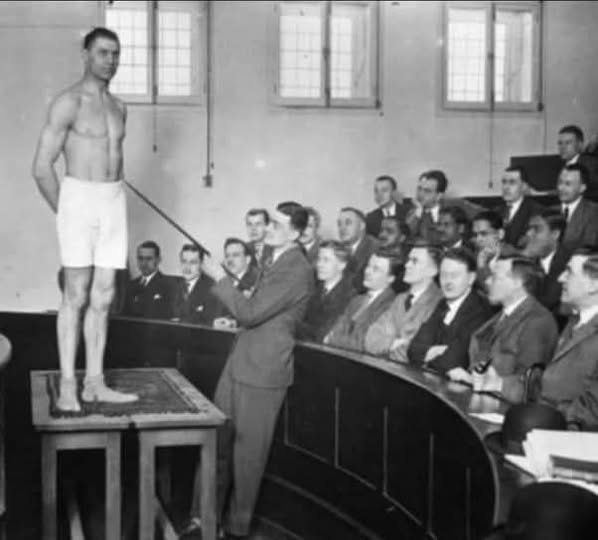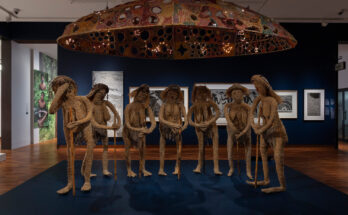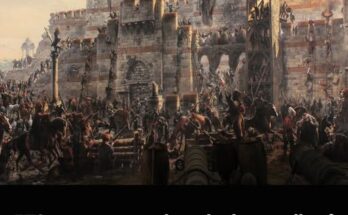
In the grand halls of academia, where knowledge and pride often walk hand in hand, there once unfolded a story that would live on as a shining testament to the power of wit over arrogance. It was in a bustling medical school, where future doctors bent over their notes and cadavers, memorizing muscles, bones, and organs in their pursuit of mastery over the human body. Professors, bearing the weight of their education and position, often wielded their authority like a sword, cutting down any who dared show ignorance — or worse, defiance.
On a day much like any other, a lecture was in progress. A senior professor, whose reputation for strictness and sharp tongue was known throughout the school, was standing before his class. His voice carried the crispness of command as he fired off questions meant to keep the students on their toes.
Among the gathered young men was a student named Aparício Torelly. Unknown to many at the time, Torelly would later gain fame as the brilliant satirist and humorist known as Barão de Itararé, a master of irony and wit. But at that moment, he was simply a young man sitting among dozens, subjected to the whims of a professor who saw questioning not as an exploration, but as a tool for dominance.
The professor, with a stern look and a tone designed to intimidate, posed a question to the class:
“Tell me, how many kidneys do we have?”
A hush fell over the room. The students knew that answering incorrectly could mean public humiliation, a tool the professor had often used to enforce obedience. Many a young scholar had felt his future tremble in the face of a sharp rebuke.
Aparício Torelly, however, was unshaken. Without missing a beat, he answered clearly:
“Four.”
A murmur rippled through the room. Eyes widened. Pens paused mid-scribble. The professor’s face twisted into a sneer. He had caught a fool — or so he thought.
“Four kidneys?” the professor repeated, his voice dripping with mockery. “And to think you aspire to become a doctor! Assistant!” he barked, snapping his fingers. “Bring some grass into the classroom — we have a donkey among us!”
The classroom erupted into nervous, scattered laughter. Some students tittered uneasily, unsure whether to side with the authority figure or to recoil at the cruelty.
But Torelly did not flinch.
He leaned back in his chair, calm as the surface of a still pond, and with perfect poise, he replied:
“And a coffee for me.”
The room fell silent again, this time for a different reason. A few students choked back chuckles, others glanced around in disbelief. Was he truly matching the professor’s sarcasm with his own?
The professor’s face flushed red with rage. How dare a mere student respond to his insult with such cool disdain! In a fit of anger, he ordered Torelly to leave the classroom at once.
Gathering his books without hurry, Torelly rose from his seat, his calm demeanor never wavering. As he stood at the threshold of the door, he turned back and said in a clear voice:
“Professor, you asked how many kidneys we have. ‘We’ — that includes both of us. I have two, and you have two. That makes four kidneys.”
A stunned silence fell over the class. The professor’s mouth opened as if to speak, but no words came out. Torelly smiled, then added, almost as an afterthought:
“Enjoy your meal, professor. May the grass be yours to savor.”
With that, he walked out, leaving behind a classroom brimming with awe and a professor choking on his own arrogance.
The Anatomy of Wit
This story is more than a funny anecdote; it is a profound lesson in the art of handling arrogance, of responding to mockery not with anger or submission, but with cleverness and courage.
In many ways, Torelly embodied the spirit of intellectual self-defense. Where others might have bowed their heads in shame or tried to stammer out an apology, he saw the opportunity to turn the situation on its head. His quick thinking not only preserved his dignity but also exposed the pettiness of the professor’s attempt at humiliation.
Wit, in its highest form, is not just about making people laugh. It is about using intelligence and humor as shields and swords — to protect oneself and to puncture the inflated egos of those who abuse their power.
In Torelly’s simple yet profound retort, we see the anatomy of true cleverness: precision, calmness, and an unflappable confidence rooted not in arrogance, but in understanding.
The Power Dynamic in Classrooms
Academic institutions are, in theory, places of learning, growth, and inquiry. Yet too often, they become arenas where power dynamics overshadow true education. Professors wield authority, and students, in their vulnerability, are sometimes subjected to displays of intellectual dominance.
In this environment, making a mistake can feel like a capital offense, and questioning authority is almost taboo.
Torelly’s experience highlights a critical flaw in such systems: when authority is used not to nurture but to belittle, it creates fear rather than enlightenment. Students become afraid to speak, to ask, to explore — and in the process, true education dies a slow death.
His refusal to be cowed serves as a reminder that respect must be mutual. Authority is not an entitlement to ridicule; it is a responsibility to guide.
Humor as a Weapon of the Weak
Throughout history, humor has been the refuge of the oppressed, the silenced, the underestimated. It has served as a subtle, yet powerful tool for those who could not fight back with brute force but who could outwit their oppressors.
Torelly’s story fits neatly into this tradition. Faced with a figure of much greater institutional power, he did not raise his voice or appeal to some authority higher up. Instead, he wielded humor like a rapier — quick, precise, and devastating.
In a society where status and titles often dictated one’s value, Torelly’s humor leveled the playing field. He reminded everyone in that room that intelligence and dignity are not conferred by a title or a position; they are intrinsic qualities that no amount of mockery can strip away.
Reflections on Courage
It’s easy to admire Torelly’s quick wit from a distance, but it’s worth pausing to consider the courage it took to act as he did.
He was not immune to the consequences. Being expelled from the classroom could have jeopardized his academic career. He risked angering not just one professor, but an entire system that prized conformity over creativity.
Yet he chose dignity over fear.
This is the essence of courage — not the absence of fear, but the decision to act rightly despite it.
Courage is often romanticized as grand, sweeping acts of heroism. Yet more often, it lives in small moments: a word spoken when silence would be safer, a joke cracked in the face of a bully, a refusal to bow to undeserved authority.
Torelly’s story teaches us that sometimes the greatest victories are won not on battlefields but in classrooms, office meetings, and everyday encounters.
Lessons for Today
In our modern world, where hierarchies still exist in classrooms, workplaces, and governments, the need for wit, humor, and courage remains as strong as ever.
How many times have we seen authority figures misuse their power? How often have we stayed silent in the face of unfairness because speaking out felt too risky?
Torelly’s story invites us to remember that silence and submission are not our only options. That we can stand up — not always with fists or anger, but with words so sharp and clear they leave no wound, only understanding.
In a time when cancel culture, public shaming, and social media pile-ons make standing your ground feel riskier than ever, the spirit of Torelly reminds us: never underestimate the power of a well-timed joke, a calm correction, or a bold smile in the face of injustice.
Conclusion: The Legacy of a Smile
Aparício Torelly would go on to become one of Brazil’s most beloved humorists, using his pen and his wit to expose hypocrisy, question authority, and champion the cause of the common man. His life was a testament to the power of laughter as a force for truth.
Yet perhaps no moment captures his spirit more perfectly than that day in the medical school, when a simple question about kidneys became a battleground for dignity, intelligence, and courage.
By refusing to be cowed, by meeting arrogance with grace and humor, Torelly taught a lesson far more valuable than any anatomical fact: that in a world full of people who wield power without wisdom, the sharpest weapon is a mind that sees clearly, speaks bravely, and smiles kindly.
And so, the next time you find yourself confronted by arrogance, remember Torelly. Remember the donkey, the grass, and the coffee. And most of all, remember: a quick wit and a calm heart can turn even the most humiliating moment into a quiet, triumphant victory.


